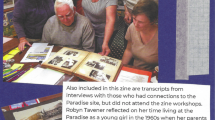Abstract
Stand-up comedy prioritises the individual performer. Yet its success relies upon awakening collective sentiments through laughter. For this article, the aesthetic form of stand-up becomes a site to explore the legacy of Durkheim’s ‘cult of the individual’. Durkheim recognised the significance of the ‘cult of the individual’ in modernity but was unable to locate its place within collective sentiments. The article advances the claim that sociology can locate individuality’s cult within the aesthetic affordances individuals have at their disposal in institutional settings. It is demonstrated that stand-up comedy becomes a way to achieve individuality in a society of advanced role differentiation, a plurality of lifeworld’s and beliefs and its associated tensions. Humor does not reconcile tensions; through humor these social conditions become ‘known’ to the modern subject at an intra-personal level. The article substantiates and illustrates these claims through a case-study of British comedian James Acaster. Methodologically the article makes use of literary and aesthetic theories to advance an alternative theory of modernity, one which highlights how stand-up comedy is valued for its ability to register—at a sensuous level—the meaningful organisation of social relations modern social actors live within.
Similar content being viewed by others
Notes
To avoid confusion, the terms recognition and mis-recognition are not employed as Bourdieu uses them in his concept of mis-recognition (or méconaissance).
References
Acaster, James. 2018. James Acaster: Repertoire—Part 3: Reset, Netflix. Accessed 27 March 2018.
Accord, S., and T. DeNora. 2008. Culture and the Arts: From Art Worlds to Arts-in-Action. The Annals of the American Academy of Political and Social Science 619: 223–237.
Alexander, J.C. 2017. The Drama of Social Life. Cambridge: Polity.
Anheier, H.K., J. Gerhards, and F.P. Romo. 1995. Forms of Capital and Social Structure in Cultural Fields. American Journal of Sociology 100 (4): 859–903.
Baker, S.A. 2014. Social Tragedy: The Power of Myth, Ritual and Emotion in New Media Ecology. Basingstoke: Palgrave Macmillan.
Berger, P.L. 2014. Redeeming Laughter: The Comic Dimension of Human Experience. Berlin: De Gruyter.
Billig, M. 2005. Laughter & Ridicule: Towards a Social Critique of Humor. London: Sage.
Bowring, F. 2016. The Individual and Society in Durkheim: Unpicking the Contradictions. European Journal of Social Theory 19 (1): 21–38.
Brodie, I. 2014. A Vulgar Art: A New Approach to Stand-up Comedy. Mississippi: University of Mississippi Press.
Burns, B. 2016. ‘Brenden Burns Interviewed by Catie Wilkins—Cambridge TV: ‘Finding the Funny’: Footage Kindly Provided by Production Company.
Carter, J., and S. Duncan. 2017. Wedding Paradoxes: Individualised Conformity and the ‘Perfect Day’. The Sociological Review 65 (1): 3–20.
Colleary, S. 2014. Performance And identity in Irish Stand-up Comedy: The Comic ‘I’. Basingstoke: Palgrave.
DeCamp, E. 2017. Negotiating Race in Stand-up Comedy: Interpretations of ‘Single Story’ Narratives. Social Identities: Journal of Race, Nation and Culture 23 (3): 326–342.
de la Fuente, E. 2008. The Art of Social Forms and the Social Forms of Art: The Sociology-aesthetic Nexus in Georg Simmel’s Thought. Sociological Theory 26 (4): 344–362.
Double, O. 2014. Getting the Joke: The Inner Workings of Stand-up Comedy. London: Bloomsbury.
Durkheim, E. 1964. The Division of Labour in Society. New York: Free Press.
Durkheim, E. 1972. L’indivdualisme et les intellectuels. In Emile Durkheim: Selected Writings, ed. A. Giddens. Cambridge: Cambridge University Press.
Durkheim, E. 2001. The Elementary Forms of Religious Life. Oxford: Oxford University Press.
Elmaleh, G. 2016. This American Life: #596: Becoming a badger. https://www.thisamericanlife.org/596/transcript Accessed 19 Feb 19.
Gell, A. 1998. Art & Agency: An Anthropological Theory. Oxford: Oxford University Press.
Gilbert, J.R. 2004. Performing Marginality: Humor, Gender and Cultural Critique. Detroit: Wayne State University Press.
Goffman, E. 1959. The Presentation of Self in Everyday Life. London: Penguin.
Goldsmith, S. 2013. ‘The Comedians Comedian Podcast—Episode 28: James Acaster: http://www.comedianscomedian.com/28-james-acaster/. Accessed 8 Aug 2019
Goldsmith, S. 2018a. ‘The Comedians Comedian Podcast—Episode 232: James Acaster: Returns (part one): http://www.comedianscomedian.com/232-james-acaster/. Accessed 8 Aug 2019.
Goldsmith, S. 2018b. ‘The Comedians Comedian Podcast—Episode 232A: James Acaster: Returns (part two): http://www.comedianscomedian.com/232A-james-acaster/. Accessed 8 Aug 2019.
Goodstein, E. 2016. Sociology as a sideline. In The Anthem Companion to Georg Simmel, ed. T. Kemple and O. Pyyhtinen. New York: Anthem Press.
Joas, H. 2013. The Sacredness of the Person. Washington, DC: Georgetown University Press.
Keisalo, M. 2018. Perspectives of (and on) a Comedic Self: A Semiotics of Subjectivity in Stand-up Comedy. Social Analysis 62 (1): 116–135.
King, A. 2010. The Afghan War and ‘Postmodern’ Memory: Commemoration and the Dead of Helmand. British Journal of Sociology 61 (1): 1–25.
King, A. 2012. The Naked Female Athlete: The Case of Rebecca Romero. International Review for the Sociology of Sport 48 (5): 515–534.
Krefting, R. 2014. All Joking Aside: American Humor and Its Discontents. Baltimore, MD: Johns Hopkins University Press.
Kuipers, G. 2015. Good Humor, Bad Taste: A Sociology of the Joke. Berlin: De Gruyter Mouton.
LaChance, D. 2007. Last Words, Last Meals, and Last Stands: Agency and Individuality in the Modern Execution Process. Law & Social Inquiry 32 (3): 701–724.
Lavin, S. 2004. Women and Comedy in Solo Performance: Phyllis Diller, Lily Tomlin, and Roseanne. London: Routledge.
Limon, J. 2000. Stand-up Comedy in Theory, Or, Abjection in America. Durham, NC: Duke University Press.
Limon, J. 2012. Death’s Following: Mediocrity, Dirtiness, Adulthood, Literature. New York: Fordham University Press.
Limon, J. 2016. Escapism; or, the Soul of Globalisation. Genre 49 (1): 51–77.
Lockyer, S. 2015. From Comedy Targets to Comedy-Makers: Disability and Comedy in Live Performance. Disability and Society 30 (9): 1397–1412.
McCormick, L. 2015. Performing Civility. Cambridge: Cambridge University Press.
Medhurst, A. 2007. A National Joke: Popular Culture and English Cultural Identities. London: Routledge.
Mulkay, M. 1988. On Humor: Its Nature and Place in Modern Society. Cambridge: Polity Press.
Nielsen, G. 2002. The Norms of Answerability. Albany: State University of New York.
Pérez, R. 2016. Racist humor: then and now. Sociology Compass. https://doi.org/10.1111/soc4.12411.
Pérez, R. 2017. Race, Gender and Comedy Awards: From Civil Rights to Color-Blindness. Comedy Studies 8 (1): 68–80.
Quirk, S. 2015. Why Stand-up Matters: How Comedians Manipulate and Influence. London: Bloomsbury Academic.
Riley, P. 2017. Layers of the Clown: Career Development in Cultural Production Industries. Academy of Management Discoveries. https://doi.org/10.5465/amd.2015.0160.
Said, E. 1989. Representing the Colonised: Anthropology’s Interlocutors. Critical Inquiry 15 (2): 205–225.
Simmel, G. 1971a. The Metropolis and Mental Life. In On Individuality & Social Forms, ed. D.N. Levine. Chicago: University of Chicago Press.
Simmel, G. 1971b. The stranger. In On Individuality & Social Forms, ed. D.N. Levine. Chicago: University of Chicago Press.
Simmel, G. 2010. The View of Life. Chicago: University of Chicago Press.
Smith, D.R. 2017. The Tragedy of Self in Digitised Popular Culture: The Existential Consequences of Metricised Fame on YouTube. Qualitative Research 17 (6): 699–714.
Smith, D.R. 2018. Comedy & Critique: Stand-up Comedy and the Professional Ethos of Laughter. Bristol: Bristol University Press.
Stebbins, R. 1990. The Laugh-Makers: Stand-up Comedy as Art, Business and Life-Style. Montreal: McGill-Queen’s University Press.
Taylor, C. 1989. Sources of the Self: The Making of Modernity Identity. Cambridge: Harvard University Press.
Tonder, L. 2014. Comic Power: Another Road Not Taken. Theory & Event 17 (4): 2014.
Varul, M. 2015. Consumerism as a Folk Religion: Transcendence, Probation and Dissatisfaction with Capitalism. Studies in Christian Ethics 28 (4): 447–460.
Weaver, S. 2011. The Rhetoric of Racist Humor: US, UK and Global Race Joking. Abingdon: Ashgate Publishing.
Wickberg, D. 1998. The Senses of Humor: Self and Laughter in Modern America. New York: Cornell University Press.
Witkin, R.W. 1995. Art & Social Structure. Cambridge: Polity Press.
Witkin, R.W. 1997. Constructing a Sociology for an Icon of Aesthetic Modernity: Olympia Revisited. Sociological Theory 15 (2): 101–125.
Acknowledgements
Thanks to Philip Smith for his critical insights and advice on earlier drafts. Thanks to Julia Carter for her reading and criticism. Two anonymous AJCS peer-reviewers provided extensive critical insight and feedback that was extremely helpful for refining and realising the argument put forward. Thank you to Stuart Goldsmith and James Acaster for permission to reproduce extracts of their interviews, and Acaster in particular to reproduce extracts of Repertoire.
Author information
Authors and Affiliations
Corresponding author
Additional information
Publisher's Note
Springer Nature remains neutral with regard to jurisdictional claims in published maps and institutional affiliations.
Rights and permissions
About this article
Cite this article
Smith, D.R. Stand-up comedy and the comedic cult of the individual: or, the humor of James Acaster. Am J Cult Sociol 9, 70–91 (2021). https://doi.org/10.1057/s41290-019-00082-x
Published:
Issue Date:
DOI: https://doi.org/10.1057/s41290-019-00082-x




